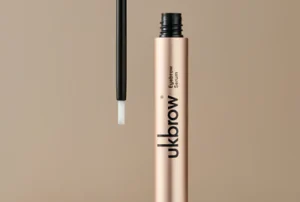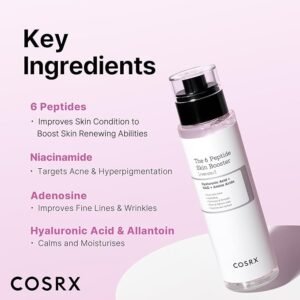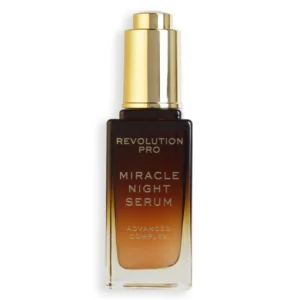Does Vitamin C Serum Cause Acne? As consumers, we are constantly seeking answers to better understand how the products we apply to our skin can impact its overall health and appearance.
Vitamin C serum has garnered massive attention in the beauty world due to its powerful antioxidant properties and its role in promoting skin health.
However, with the rise in its popularity, many users are left wondering, “Does Vitamin C serum cause acne?” We’re here to decipher fact from fiction and clarify this much-debated topic.
Does Vitamin C Serum Cause Acne?

In short, Vitamin C serum doesn’t directly cause acne. However, specific elements can contribute to breakouts for some users.
For instance, those with sensitive skin may experience irritation from a high concentration of Vitamin C, leading to inflammation that could result in acne.
Additionally, serums formulated with an oil-based carrier may not be suitable for individuals with oily skin, as it could exacerbate clogged pores and potentially trigger acne.
Therefore, while Vitamin C serum offers many skincare benefits, it’s crucial to remember that its impact can vary widely based on skin type, the product’s specific formulation, and its concentration.
It is also essential to gradually incorporate new skincare products into your routine to allow your skin to adjust and minimize the risk of adverse reactions such as acne.
Understanding What Vitamin C Serum is

Vitamin C serum is a skin care product designed for topical use that features Vitamin C, a necessary nutrient for skin health, as its main ingredient.
The nutrient is celebrated for its potent antioxidant properties, which not only shield the skin from environmental aggressors like pollution and UV rays, but also boost collagen production and brighten the complexion, giving the skin a more youthful, radiant appearance.
To enhance the overall effectiveness and benefits of the serum, some formulations may include other potent ingredients such as hyaluronic acid, which promotes hydration, ferulic acid that increases the efficacy of other antioxidants, or vitamin E, which is known for its moisturizing properties.
However, it’s worth noting that these additional ingredients, while beneficial, could potentially trigger an adverse reaction in certain individuals with specific skin sensitivities.
Identifying the Causes of Acne
Breaking down the causes of acne requires understanding of several key factors. Acne is generally a result of excess sebum (oil) production, blocked pores, the presence of acne-causing bacteria, and skin inflammation.
It’s not solely about having oily skin or poor hygiene. A variety of internal and external triggers often influences these factors.
For instance, hormonal fluctuations, particularly during puberty, pregnancy, and menstrual cycles, can accelerate sebum production, creating a prime environment for acne. Dietary choices, specifically foods high in sugars and fats, can also aggravate acne in some individuals.
Stress is another contributing factor as it can trigger inflammation and oil production. Additionally, specific skincare or makeup products can exacerbate acne, not because they’re inherently harmful, but because they may not be suited to a person’s specific skin type or condition.
Remember, products that work well for one individual may not have the same effect on another, due to the diversity of our skin types, sensitivities, and conditions. A common misconception is that products causing acne are always ‘comedogenic’ or pore-blocking. In reality, even non-comedogenic products can cause breakouts if they’re not appropriate for your skin.
The relationship between acne and skincare products underlines the importance of understanding and catering to your unique skin requirements when selecting products for your regimen.
Thus, just because a product like Vitamin C serum has beneficial properties, it may not necessarily agree with all skin types or conditions. That’s why it’s crucial to consider the specific ingredients in a product, how it’s formulated, and how your skin might respond to it.
Exploring the Connection between Vitamin C Serum and Acne
The potential link between Vitamin C serum and acne is not as straightforward as it seems. While the serum itself is not inherently acne-inducing, specific circumstances can contribute to breakouts.
For example, a high concentration of Vitamin C might be too strong for certain skin types, causing irritation and inflammation that could eventually lead to acne. Additionally, the type of carrier used in the serum formulation can also play a role.
If the serum uses an oil-based carrier, it might not be suitable for those with oily skin as it could potentially lead to clogged pores and subsequent acne breakouts.
Thus, the formulation and concentration of Vitamin C serum, combined with individual skin characteristics, can influence whether or not acne occurs after its use.
This highlights the importance of choosing a serum that aligns with your skin type and sensitivity level. It also underscores the value of a gradual introduction of new skincare products into your regimen, allowing your skin time to adjust.
Why Some People Breakout after Using Vitamin C Serum
Individual skin responses to Vitamin C serum vary widely due to our unique skin characteristics. Some individuals might experience breakouts post application due to an adverse reaction or allergy to one or more ingredients present in the serum.
In certain cases, these breakouts could be due to an initial ‘purging’ phase – a brief period of increased breakouts as your skin adjusts to the new product.
During this phase, the serum might speed up the skin’s natural exfoliation process, bringing pre-existing microcomedones (the initial acne blockages) to the surface faster, thus creating temporary breakouts.
However, it’s important to note that ‘purging’ is different from an allergic reaction or sensitivity breakout.
If you continue to experience breakouts or irritation for several weeks after introducing Vitamin C serum, it might suggest an intolerance to the product rather than a purging phase. In such cases, discontinuation of use and consultation with a dermatologist may be advisable.
Also, remember, the frequency and method of serum application, along with its formulation specifics, can influence its compatibility with your skin. Balancing these aspects can assist in minimizing potential breakouts associated with Vitamin C serum use.
Tips to Use Vitamin C Serum Without Causing Acne
Minimizing the risk of acne when using Vitamin C serum can be managed with some simple, yet effective steps. Begin by conducting a patch test.
Apply a small amount of the serum on a discreet area of your skin, such as your wrist or behind your ear, and monitor for any reactions. If after 24 to 48 hours no redness, itching, or other irritation has occurred, it is likely safe to proceed with the full application.
Next, when first adding Vitamin C serum to your regimen, it’s wise to take a gradual approach. Rather than daily application, use the serum every other day initially, allowing your skin time to adjust to the new product.
Observing how your skin responds can help you determine the ideal frequency of application for your specific needs.
Also crucial is selecting a serum tailored to your individual skin type. For instance, if your skin tends to be oily, it might be beneficial to opt for a water-based Vitamin C serum, which is less likely to contribute to pore clogging compared to an oil-based formulation.
Another important factor is ensuring your skin is thoroughly clean before applying the serum. This can be achieved through proper cleansing, which removes dirt, oil, and other impurities that might interfere with the serum’s absorption and performance.
Do bear in mind that everyone’s skin is unique and may react differently to the same product. These tips aim to help you use Vitamin C serum in a manner that is most likely to bring about the desired benefits, while reducing the chances of breakouts.
However, if persistent skin issues occur, it would be advisable to seek professional advice from a dermatologist.
Consulting a Dermatologist for Personalized Advice
Though the tips provided in this article can help mitigate the risk of breakouts when using Vitamin C serum, it’s crucial to remember that each person’s skin is distinctive. Therefore, what yields positive results for one might not necessarily do the same for another.
Persistent acne or other skin complications after using the serum signal the need to seek professional help. A dermatologist can give advice that is tailored specifically to your skin’s needs.
They can thoroughly evaluate your skin type, its particular sensitivity, and the nature of your acne. Based on this evaluation, they can provide recommendations on whether to continue using the Vitamin C serum, modify its usage, or explore other skin treatments or products altogether.
In conclusion, when facing ongoing skin problems after using Vitamin C serum, don’t hesitate to reach out to a dermatologist for guidance specifically curated to your unique skin requirements.




